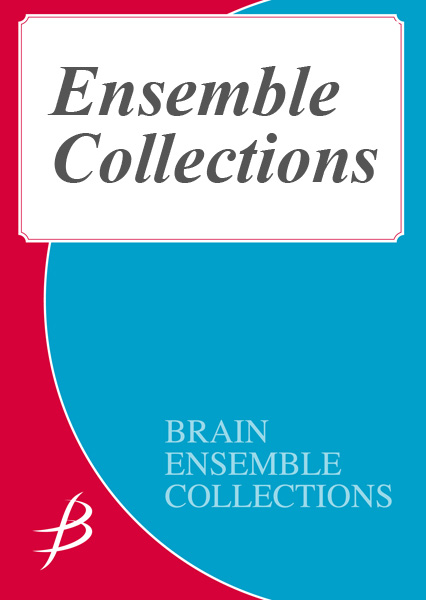Nous utilisons des cookies pour améliorer votre expérience utilisateur. Pour se conformer à la nouvelle directive concernant la vie privée, nous devons vous demander votre consentement pour définir des cookies. En savoir plus.
<< Retour à l'aperçu

Dances From Terpsichore II

Partitions pour octuor de bois.
| Article no.: | BRENMS84556 |
|---|---|
| Compositeur: | Michael Praetorius |
| Arrangeur: | Makoto Onodera |
| Niveau: | 4½ |
| Durée: | 5:00 |
| Editeur: | Brain Music |
Disponible dans ces catégories
40,00 €
TTC
Disponibilité :
En stockExpédié :
Sous 1 jour ouvrableI. Bransle double [XII-3] | II. Bransle de Villages [XIV-5] | III. Bransle Gay [I] | IV. Bransle double de Poictu [IX] | V. Bransle de Villages [XIV-4] | VI. Reprinse [CCCIX] | (VII. Bransle de Villages [XIV-5])Flute & Piccolo (doubling Percussion) | Flute | Oboe or Bb Clarinet (doubling Percussion) | Bb Clarinet 1 | Bb Clarinet 2 (doubling Percussion) | Eb Alto Saxophone | Bb Tenor Saxophone or Bb Clarinet (doubling Manjira) | Eb Baritone Saxophone or Bb Bass Clarinet
In the early 17th century, Germany was trying to make significant progress by incorporating the musical styles of Italy and France, leading music regions of the time, into its own musical language.
Michael Praetorius (1571-1621) was extremely active in Germany during this period. As a music theorist, he wrote the "Syntagma Musicum", which is said to be the world's first musical dictionary, and as a composer, he composed a vast number of religious works and secular music.
Praetorius arranged French dances for instrumental ensemble, which were not well known in Germany at the time and published them in 1612 with a preface on how to play French dances. This collection of over 500 dances, the largest of its time, was named after Terpsichore, one of the nine goddesses of Greek mythology who presided over dance and chorus. This arrangement is the second collection, following an arrangement for woodwind octet arranged in 2015. It was arranged for Hanasaki Tokuharu High School in Saitama Prefecture (directed by Tomoko Kawaguchi) and Toin Gakuen High School in Yokohama as a performance piece for the 2020 Ensemble Contest.
The solo at the beginning is played by flute but another suitable player may perform it.
-If Manjira at B is not available, you may substitute Finger Cymbal or Antique Cymbal.
-Percussion instruments designated as "Drum" should be an appropriate choice of "Renaissance Drum, Tom-tom, Conga, Bongo, Djembe," etc., regardless of size (S, M, L, etc).
-Considering the character of the scene, select percussion instruments, mallets, or sticks (or hands).
(For instance, you might use different instrument, even if the same "Drum S" is indicated.)
In the early 17th century, Germany was trying to make significant progress by incorporating the musical styles of Italy and France, leading music regions of the time, into its own musical language.
Michael Praetorius (1571-1621) was extremely active in Germany during this period. As a music theorist, he wrote the "Syntagma Musicum", which is said to be the world's first musical dictionary, and as a composer, he composed a vast number of religious works and secular music.
Praetorius arranged French dances for instrumental ensemble, which were not well known in Germany at the time and published them in 1612 with a preface on how to play French dances. This collection of over 500 dances, the largest of its time, was named after Terpsichore, one of the nine goddesses of Greek mythology who presided over dance and chorus. This arrangement is the second collection, following an arrangement for woodwind octet arranged in 2015. It was arranged for Hanasaki Tokuharu High School in Saitama Prefecture (directed by Tomoko Kawaguchi) and Toin Gakuen High School in Yokohama as a performance piece for the 2020 Ensemble Contest.
The solo at the beginning is played by flute but another suitable player may perform it.
-If Manjira at B is not available, you may substitute Finger Cymbal or Antique Cymbal.
-Percussion instruments designated as "Drum" should be an appropriate choice of "Renaissance Drum, Tom-tom, Conga, Bongo, Djembe," etc., regardless of size (S, M, L, etc).
-Considering the character of the scene, select percussion instruments, mallets, or sticks (or hands).
(For instance, you might use different instrument, even if the same "Drum S" is indicated.)
Woodwind Octet,ENMS-84556
 Français
Français Nederlands
Nederlands  English
English  Deutsch
Deutsch 
